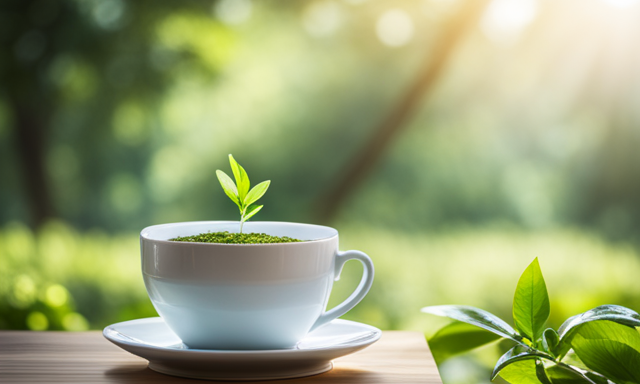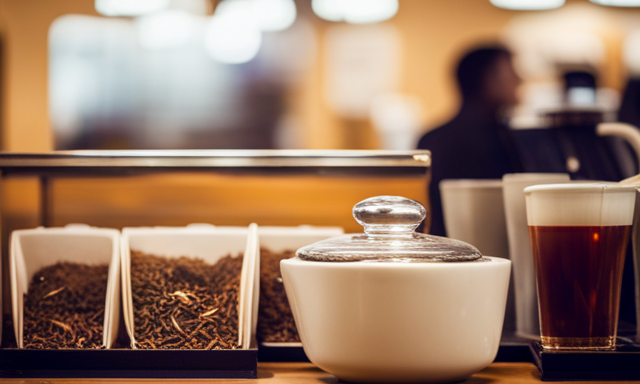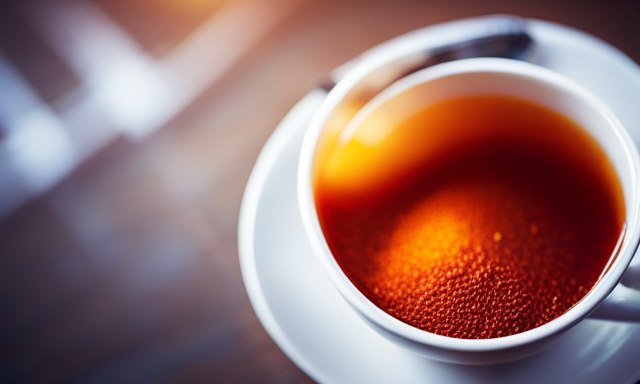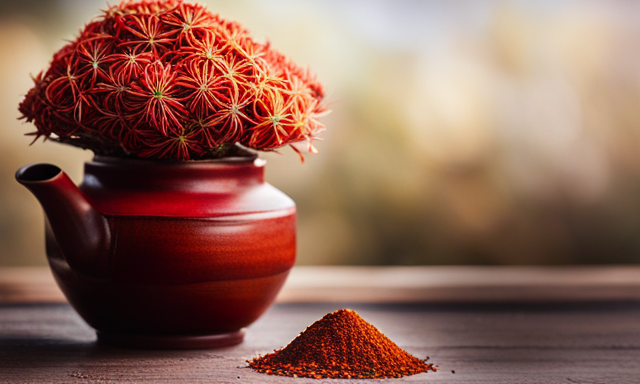As I sit here, sipping a warm cup of rooibos tea, I am struck by its unique and delightful flavor. This beloved South African beverage has gained popularity worldwide, but have you ever wondered what exactly is in it?
In this article, we will delve into the origins and history of rooibos tea, explore its nutritional composition, and uncover its potential health benefits.
But it doesn’t stop there. We will also discuss how to brew the perfect cup of rooibos tea and explore its culinary applications. Additionally, we will shed light on the sustainability and fair trade practices involved in rooibos tea production.
So join me on this journey as we uncover the secrets of rooibos tea, and discover why it has become a beloved and relaxing beverage for many.
Key Takeaways
- Rooibos tea has a natural sweet and nutty flavor, and can be enhanced with sweeteners like honey, agave syrup, sugar, or stevia.
- It can be enjoyed with milk alternatives such as almond milk, coconut milk, or soy milk, which adds a creamy texture and complements the earthy notes of the tea.
- Cold brewing the tea overnight in cold water results in a smoother and less bitter brew, highlighting its natural sweetness and fruity undertones.
- Rooibos tea can be used in various culinary applications, enhancing the flavors of sweet and savory dishes, and can be infused into creams, syrups, and desserts to add depth and complexity.
Origin and History of Rooibos Tea
Rooibos tea has a fascinating origin and rich history. It originated in the Cederberg region of South Africa, where the indigenous Khoisan people have been cultivating and using it for centuries. The plant, Aspalathus linearis, grows exclusively in this area due to the unique soil and climate conditions.
The Khoisan people would harvest the leaves, ferment them, and then dry them in the sun. The resulting brew, with its reddish-brown color and earthy flavor, became known as rooibos tea.
In the early 20th century, rooibos tea gained popularity beyond South Africa, and it is now enjoyed worldwide for its numerous health benefits and refreshing taste.
Speaking of taste, let’s explore rooibos tea’s unique flavor profile in the next section.
Rooibos Tea’s Unique Flavor Profile
Indulge in the rich and distinct flavor notes of rooibos tea. It offers a unique taste experience that will captivate your senses. Rooibos tea’s flavor can be described as sweet, earthy, and slightly nutty, with hints of vanilla and caramel.
This herbal infusion is caffeine-free, making it a perfect choice for those looking to reduce their caffeine intake.
Additionally, rooibos tea is known for its numerous health benefits. It is rich in antioxidants, which help protect the body against free radicals and oxidative stress. Rooibos tea has also been shown to have anti-inflammatory properties and may aid in digestion.
Transitioning into the subsequent section about the nutritional composition of rooibos tea, it is important to explore the various vitamins and minerals it contains.
Nutritional Composition of Rooibos Tea
Discover the incredible nutritional benefits packed into every sip of this caffeine-free herbal infusion – you’ll be amazed at what rooibos tea can offer your health!
-
Rooibos tea is a rich source of antioxidants, including aspalathin and nothofagin, which help protect the body against free radicals and oxidative stress.
-
It contains essential minerals such as calcium, magnesium, and potassium, which are important for maintaining healthy bones and supporting cardiovascular health.
-
Rooibos tea is also known for its high flavonoid content, which has been linked to reduced inflammation and improved immune function.
With zero caffeine content, rooibos tea is a great alternative to traditional teas and coffee. Its natural sweetness and nutty flavor profile make it a delicious and guilt-free beverage choice.
Now that you know about the nutritional benefits of rooibos tea, let’s explore its potential health benefits in the next section.
Potential Health Benefits of Rooibos Tea
Rooibos tea has been found to possess anti-inflammatory properties, which can potentially help reduce inflammation in the body.
Additionally, it is said to promote digestive health by soothing the digestive system and alleviating symptoms such as indigestion and stomach cramps.
Furthermore, studies suggest that rooibos tea may support heart health by lowering blood pressure and reducing the risk of heart disease.
Anti-inflammatory Properties
With its anti-inflammatory properties, rooibos tea has been hailed as a soothing elixir for those seeking natural remedies. Scientific research has shown that this herbal tea contains compounds that can help reduce inflammation in the body.
Here are three key ways in which rooibos tea exerts its anti-inflammatory benefits:
-
Antioxidant activity: Rooibos tea is rich in antioxidants, such as aspalathin and nothofagin, which help neutralize harmful free radicals and reduce oxidative stress, a major contributor to inflammation.
-
Inhibition of inflammatory enzymes: Rooibos tea has been found to inhibit the activity of enzymes, such as cyclooxygenase-2 (COX-2) and lipoxygenase, which are involved in the production of inflammatory molecules in the body.
-
Immune modulation: Rooibos tea has been shown to modulate the immune system, helping to regulate the inflammatory response and prevent excessive inflammation.
These findings highlight the potential of rooibos tea as a natural anti-inflammatory remedy.
Moving forward, let’s explore how this tea promotes digestive health.
Promotes Digestive Health
After learning about the anti-inflammatory properties of rooibos tea, let’s now delve into its ability to promote digestive health. As an avid tea drinker, I have always been intrigued by the impact of different teas on my body. When it comes to promoting gut health, rooibos tea is a standout. Its unique blend of antioxidants, including aspalathin and nothofagin, helps to soothe and calm the digestive system, reducing inflammation and alleviating common gastrointestinal issues. Additionally, rooibos tea is rich in fiber, which aids digestion by supporting regular bowel movements and preventing constipation. It acts as a gentle yet effective natural remedy for those struggling with bloating or indigestion. Now, let’s explore how rooibos tea supports heart health in the next section.
Supports Heart Health
Improve your cardiovascular health by incorporating rooibos tea into your daily routine. Rooibos tea is not only delicious, but it also offers a range of heart-healthy benefits.
Studies have shown that drinking rooibos tea can help support heart health by reducing inflammation and oxidative stress, both of which are known to contribute to cardiovascular disease. Rooibos tea is rich in antioxidants, such as aspalathin and quercetin, which have been linked to a reduced risk of heart disease.
These antioxidants help to protect the heart by preventing the oxidation of LDL cholesterol and improving blood flow. By enjoying a cup of rooibos tea daily, you can give your heart the cardiovascular support it needs.
Transitioning to the subsequent section, rooibos tea is also a relaxing and calming beverage that can benefit your overall well-being.
Rooibos Tea as a Relaxing and Calming Beverage
When you sip on a cup of rooibos tea, you’ll feel its soothing and calming effects wash over you, making it the perfect beverage to relax and unwind after a long day.
Rooibos tea is well-known for its relaxing properties and calming effects, which can help reduce stress and anxiety. The tea contains antioxidants, such as aspalathin and nothofagin, which have been found to have a calming effect on the nervous system.
Additionally, rooibos tea is free from caffeine, making it a great choice for those looking to unwind without the stimulating effects of other teas or coffee. Its mild and slightly sweet flavor adds to its appeal as a relaxing and calming beverage.
Moving on to the next section about rooibos tea as a hydrating drink…
Rooibos Tea as a Hydrating Drink
Sipping on a cup of rooibos tea feels like a refreshing waterfall cascading down your throat, hydrating your body and quenching your thirst.
Not only does rooibos tea provide a delightful drinking experience, but it also offers numerous health benefits. One of the key properties of rooibos tea is its high antioxidant content. Antioxidants help protect our bodies from damage caused by harmful free radicals.
Additionally, rooibos tea is an excellent choice for those looking to reduce their caffeine intake. Unlike traditional teas, rooibos tea is naturally caffeine-free, making it a suitable option for individuals who are sensitive to caffeine or prefer to avoid it altogether.
Now that we understand the hydrating and health-promoting qualities of rooibos tea, let’s explore how to brew the perfect cup for a truly satisfying experience.
How to Brew the Perfect Cup of Rooibos Tea
When brewing the perfect cup of rooibos tea, it’s important to consider the water temperature and steeping time. The optimal water temperature for rooibos tea is around 203°F (95°C), which is just below boiling point. Steeping the tea for 5-7 minutes allows for the full flavor and health benefits to be extracted.
While some may prefer to enjoy rooibos tea as is, others may choose to add sweeteners or milk. It’s important to note that rooibos tea naturally has a sweet and nutty flavor, so adding sugar or honey should be done sparingly, if at all. Milk or cream can be added to create a creamier texture, but it’s purely based on personal preference.
For those who prefer a cold brew option, rooibos tea can be steeped in cold water for several hours or overnight. This method brings out a milder flavor and is a refreshing alternative to hot tea. Cold brewing is also known to retain more of the tea’s antioxidants and health benefits.
Water Temperature and Steeping Time
In order to extract the full flavor of the rooibos tea, it is crucial to steep it at the appropriate water temperature and for the recommended amount of time.
Rooibos tea should be steeped in water that is heated to about 208°F (98°C). This higher temperature allows the tea leaves to release their rich flavors and aromas.
Steeping the tea for about 5-7 minutes is recommended to achieve the desired strength. However, steeping it for longer can result in a bitter taste, so it’s important to keep an eye on the steeping time.
After steeping the tea, it is time to consider adding sweeteners or milk to enhance the flavor.
Adding Sweeteners or Milk
To enhance the flavor, you can add sweeteners or milk to your brewed rooibos tea.
When it comes to sweeteners, there are various options to choose from. If you prefer a natural sweetener, you can try adding honey or agave syrup. Both options provide a subtle sweetness without overpowering the tea’s unique taste. For those who prefer a sweeter flavor, you can opt for sugar or stevia.
As for milk alternatives, you have a few choices. Almond milk, coconut milk, and soy milk are popular options that can add a creamy texture to your tea. These alternatives also complement the earthy notes of rooibos tea.
Now, let’s move on to the next section where we explore cold brew options.
Cold Brew Options
When it comes to enjoying rooibos tea, there are various methods to explore. In the previous section, we discussed the option of adding sweeteners or milk to enhance the flavor.
Now, let’s delve into the world of cold brew options. Cold brewing rooibos tea involves steeping the tea leaves in cold water for an extended period, typically overnight. This method allows for a slower extraction of flavors, resulting in a smoother and less bitter brew.
Additionally, cold brew techniques can bring out different flavor variations in rooibos tea, highlighting its natural sweetness and fruity undertones. Whether you prefer a refreshing iced rooibos tea or a chilled rooibos tea latte, experimenting with cold brew methods can provide a unique and delightful taste experience.
Moving forward, let’s explore the exciting ways rooibos tea can be used in culinary applications.
Rooibos Tea in Culinary Applications
Although commonly enjoyed as a beverage, rooibos tea lends its unique flavor and subtle sweetness to various culinary creations. Its earthy and slightly nutty taste can enhance both sweet and savory dishes. Rooibos tea is often used as a base for marinades, dressings, and sauces, adding depth and complexity to the flavors. It can be infused into creams, syrups, and desserts, providing a delicate tea essence. The tea’s natural antioxidants and minerals also make it a healthy addition to recipes. To highlight the versatility of rooibos tea in culinary applications, consider the following table:
| Culinary Uses | Rooibos Tea Recipes |
|---|---|
| Marinades | Rooibos-infused grilled chicken |
| Dressings | Rooibos vinaigrette |
| Sauces | Rooibos glaze for roasted vegetables |
| Desserts | Rooibos-infused panna cotta |
Moving on to sustainability and fair trade practices in rooibos tea production, it is important to consider the environmental and ethical aspects of its cultivation and harvesting.
Sustainability and Fair Trade Practices in Rooibos Tea Production
Sustainability and fair trade practices in the production of rooibos tea ensure that the cultivation and harvesting methods align with environmental and ethical standards. These practices promote sustainable farming by minimizing the use of harmful chemicals and pesticides, reducing water consumption, and preserving biodiversity. Ethical sourcing guarantees that the farmers receive fair wages and are provided with safe working conditions.
To achieve sustainability and ethical practices in rooibos tea production, the following key steps are taken:
-
Organic farming: Rooibos is cultivated without the use of synthetic fertilizers or pesticides, ensuring that the tea is free from harmful residues.
-
Water conservation: Farmers employ irrigation systems that minimize water usage, reducing the strain on local water resources.
-
Biodiversity preservation: By maintaining natural vegetation and protecting indigenous plant and animal species, rooibos farming supports biodiversity conservation.
-
Fair trade certification: Rooibos tea producers adhere to fair trade principles, ensuring that farmers receive fair prices for their crops and have access to social and educational benefits.
In conclusion, sustainable farming practices and ethical sourcing are integral to the production of rooibos tea, promoting environmental stewardship and improving the livelihoods of farmers. Transitioning into the next section, it is important to understand the health benefits of rooibos tea.
Conclusion and Final Thoughts
In wrapping up this discussion, it’s clear that the sustainability and fair trade practices in rooibos tea production go hand in hand with the numerous health benefits it offers.
Rooibos tea is not only a delicious and refreshing beverage, but it is also packed with antioxidants and other beneficial compounds. These antioxidants have been linked to a reduced risk of chronic diseases such as heart disease and cancer.
Additionally, rooibos tea is caffeine-free, making it a great alternative for those looking to cut back on their caffeine intake.
The sustainable and fair trade practices employed in its production ensure that the tea is cultivated in an environmentally friendly manner and that the farmers are paid a fair wage.
Overall, incorporating rooibos tea into your diet can be a great way to support sustainable practices and improve your health.
In conclusion, rooibos tea is a wonderful choice for both the planet and your well-being.
Frequently Asked Questions
What are the different types of rooibos tea available?
There are various types of rooibos tea available, including vanilla, honey, and berry flavors. One interesting statistic is that rooibos tea is caffeine-free and rich in antioxidants, which can promote heart health and boost the immune system.
Can rooibos tea be consumed by people with certain dietary restrictions, such as those who are gluten-free or lactose intolerant?
Rooibos tea is a suitable option for those with dietary restrictions like gluten intolerance or lactose intolerance. It is naturally gluten-free and does not contain any lactose, making it a safe and enjoyable choice for individuals with these dietary concerns.
Is rooibos tea safe for pregnant women to drink?
Rooibos tea is totally safe for pregnant women. It doesn’t contain any magical substances, but it’s packed with antioxidants that promote overall health and well-being. Plus, it won’t affect breastfeeding. Cheers to that!
Are there any potential side effects or risks associated with drinking rooibos tea?
There are no known side effects or risks associated with drinking rooibos tea. It is generally considered safe for consumption. However, it is important to note that the potential health benefits and recommended daily intake may vary for each individual.
How does the caffeine content in rooibos tea compare to other types of tea or coffee?
Compared to other teas or coffee, rooibos tea has no caffeine. However, it offers various health benefits such as antioxidants and anti-inflammatory properties. It’s a great choice for those looking for a caffeine-free alternative.
Conclusion
In conclusion, after exploring the origin, flavor profile, nutritional composition, and potential health benefits of Rooibos tea, it is evident that this beverage is more than just a tasty drink.
With its calming and relaxing properties, it can be a soothing companion in our busy lives.
Brewing the perfect cup of Rooibos tea is like creating a symphony of flavors, where each sip takes you on a journey of warmth and comfort.
So, why not indulge in this delightful elixir and let it be the gentle breeze that carries away your worries.










